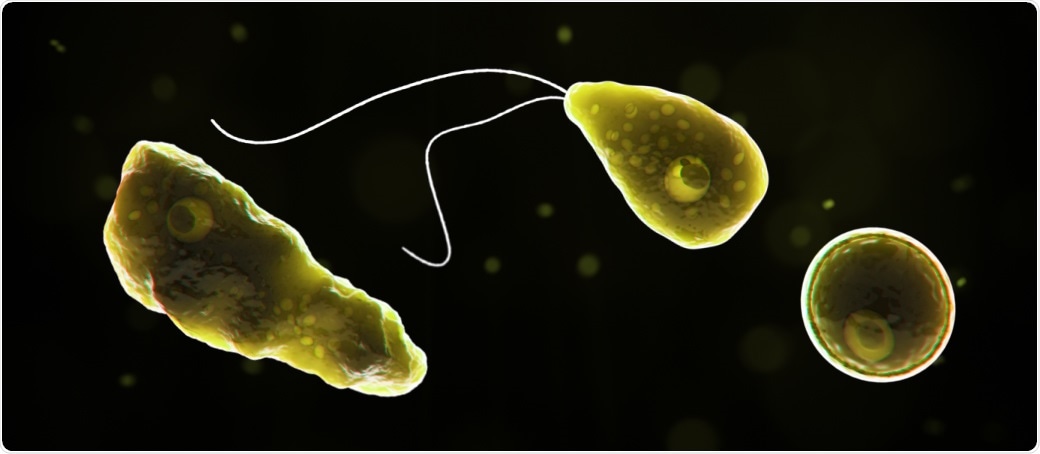A man in Florida has been infected with a rare and potentially fatal brain-eating amoeba, the Florida Department of Health confirmed.
The health agency announced that one patient in Hillsborough County contracted the Negleria fowleri, a water-borne and single-cell amoeba that targets the brain. The amoeba can cause a rare infection of the brain known as primary amebic meningoencephalitis (PAM), which destroys brain tissue.

Computer-generated representation of Naegleria fowleri in its ameboid trophozoite stage, in its flagellated stage, and in its cyst stage. Credit: CDC
What is Naegleria fowleri?
Amoebas are single-celled organisms. Naegleria fowleri is a type of amoeba, dubbed as the brain-eating species discovered in 1965. It was first identified in Australia but is believed to have evolved in the United States. The species is usually found in ponds, rivers, lakes, and other warm freshwater environments. There are over 20 species of Naegleria but Naegleria fowleri is the only type that infects humans.
Specifically, the amoeba is present in warm lakes, ponds and rock pits, mud puddles, untreated swimming pools and spas, warm and slow-flowing rivers with low water levels, hot springs and other geothermal water sources, thermally polluted waters, such as runoff from power plants, soil-like indoor dust, and aquariums. Naegleria can also be found in soil; however, water is the only known source of human infection. Naegleria fowleri cannot survive in water that is clean, cool and adequately chlorinated.
Since the 1960s, there have been only 37 cases of Naegleria fowleri in Florida, the Department of Health said. Only four people of the 145 known infected people across the United States have survived.
The U.S. Centers for Disease Control and Prevention (CDC) reports that brain-eating amoeba infections are rare, particularly Naegleria fowleri. In the 10 years between 2009 and 2018, 34 infections were reported in the U.S. Of these patients, 30 were infected by recreational water, three contracted the amoeba after performing nasal irrigation using contaminated tap water, and one patient was infected by contaminated tap water used on a backyard slip-n-slide.
The Naegleria fowleri enters the body through the person’s nose while swimming or bathing in contaminated water. Its peak season in Florida is July to September and grows best at temperatures of 115 degrees Fahrenheit. In some cases, it is possible to contract it in swimming pools that are not adequately chlorinated or by using contaminated neti pots, used to clear sinuses. However, it cannot be contracted by drinking contaminated water since it only enters the brain through the nose.
The common symptoms of these infections include frontal headache, fever, nausea, and vomiting. In worse cases, the symptoms progress, leading to seizures, stiff beck, altered mental status, and coma.
The initial symptoms of the infection begin about five days after infection, but it can appear between one to nine days. These symptoms include frontal headache, fever, nausea, and vomiting. After these, worse symptoms develop, including a stiff neck, lack of attention to people, confusion, altered mental status, loss of balance, seizures, and hallucinations.
After the initial symptoms, the disease progresses and may lead to coma and deaths within five days. This type of infection is very deadly, with a fatality rate of over 97 percent.
Naegleria fowleri infection cannot be spread from one person to another.
Florida case
The Department of Health did not mention the exact area where the infection was reported or any details about the patient.
Infections with the amoeba usually occur when temperatures increase for prolonged periods, leading to higher water temperatures and lower water levels. The health officials that as the summer season enters, there is a high risk of contracting the single-cell organism.
They urge residents to avoid swimming in warm freshwater and thermally polluted bodies of water, like those that are near power plants. If water levels are low and temperatures are high, people should avoid water activities wherein the water can enter the nose.
“Hold the nose shut or use nose clips when taking part in water-related activities in bodies of fresh warm water such as lakes, rivers, or hot springs,” the DOH advised.
“Avoid digging in or stirring up the sediment while taking part in water-related activities in shallow, warm freshwater areas. Please note exposure to the amoeba may also occur when using neti pots to rinse your sinuses of cold/allergy-related congestion or religious rituals with tap water. Use only boiled and cold, distilled, or sterile water for making sinus rinse solutions for neti pots or performing ritual ablutions,” it added.
The DOH recommends that anyone with a risk of the illness should report to their healthcare provider as soon as symptoms appear.